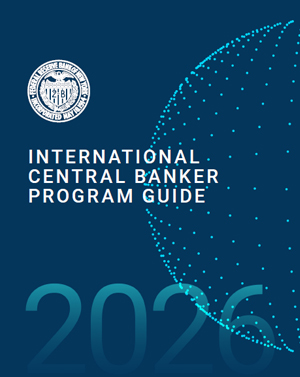The Federal Reserve Bank of New York's international seminars, training programs and conferences position the New York Fed as a leader in policy discussions and education for central bankers from around the world. In the current environment, it is critical for central bankers and financial supervisors to have opportunities to connect, learn from each other, and share best practices within and across regions. To help support these efforts, the New York Fed has developed a suite of in-person programs for 2026. These programs offers the opportunity to interact with a broad cross-section of central bankers and financial supervisors on a range of timely and important topics.

For 49 years, the Central Banking Seminar has been offered annually in the fall at the New York Fed. The program is designed to broaden the experience of central bankers who have been identified as potential leaders by their respective institutions. The seminar will be held in-person.
Participation in the Central Banking Seminar should be mid-level to senior officers with sufficient education and work experience to be able to take advantage of the material and interactive format, and must be nominated by their institution. Participants should have some background in financial markets and monetary and financial policy to derive maximum benefit from the program. Fluency in English is required.Speakers at both the Central Banking Seminar and central banker specialized programs are recognized experts in economics, monetary policy, financial regulation, payment systems and the financial markets. Participants have the opportunity to interact with and ask questions of presenters, Federal Reserve Bank officials and other senior policymakers.
The New York Fed's central banking programs offer participants opportunities to network and connect with colleagues from around the world to deepen their understanding of issues relevant to all policymakers. The networking opportunities in our programs have led to lasting relationships, facilitating communication among central bankers to the mutual benefit of individuals and institutions.
You can find answers in our list of frequently asked questions (FAQs).

(Registration closes on March 2, 2026)
Program |
Date |
|
Payments
|
April 27-29
|
|
Risk Management and Internal Audit |
April 27-30
|
|
U.S. Monetary Policy Implementation
|
May 11-13
|
|
Foreign Exchange Reserve Portfolio Management (offered Jointly with the BIS) |
May 18-21
|
Program |
Date |
|
Central Banking Seminar (Registration opens on June 29, 2026) |
Sept 28-Oct 2
|
|
Supervision (Registration opens on June 29, 2026) |
October 13-15
|
|
U.S. Monetary Policy Implementation (Registration opens on August 3, 2026) |
November 2-4
|















